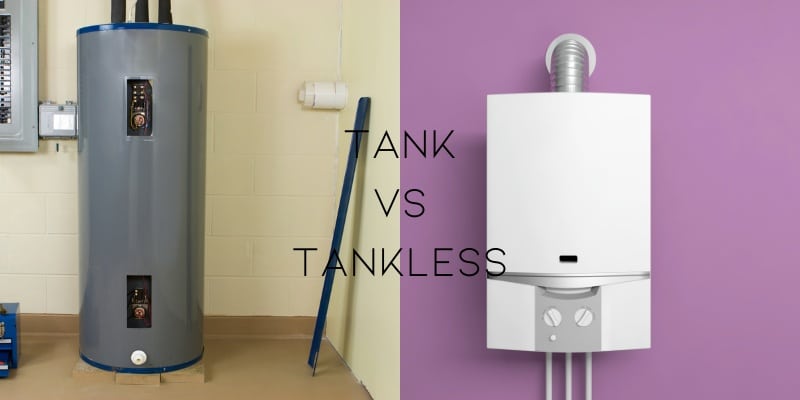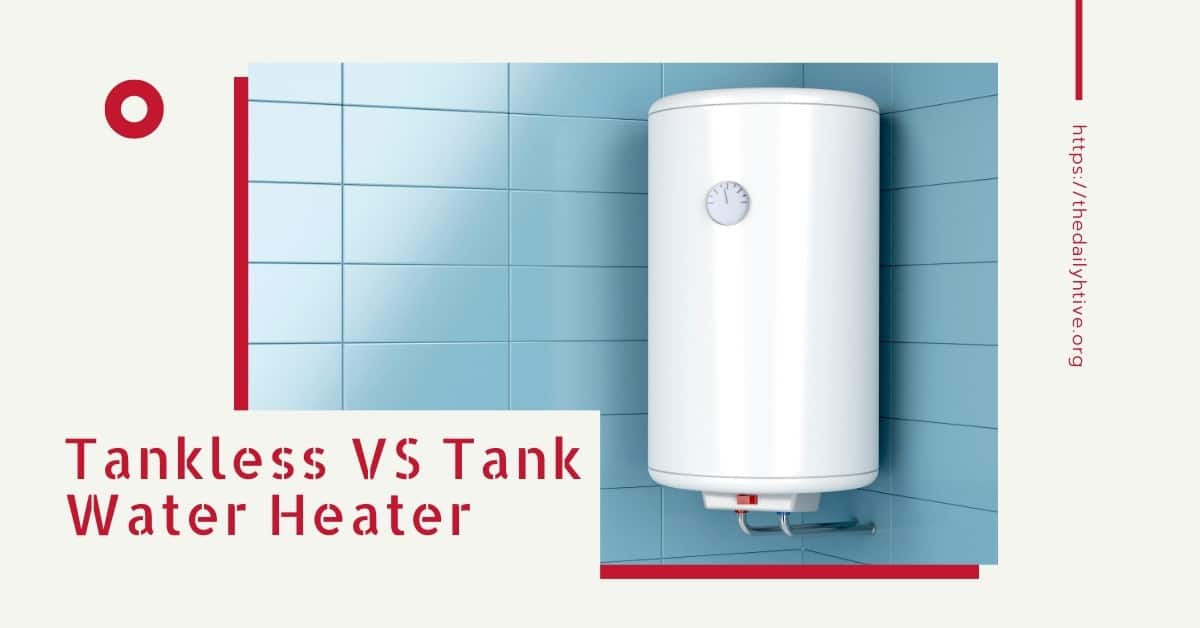Which one would be best for your home between the storage tank and tankless water heater? In this post, we’ll review the two models and inform you of everything you need to know to make a decision about which type of water heater to choose.
If you’re thinking of replacing or installing a new water heater system for your home, what we normally advise is basically that you have two broad choices:
- You can either install a conventional storage tank (tank-based water heater) or
- A tankless water heater system is also known as an on-demand water heater or instant water heater.
Which of the two models best suits your needs will depend on several factors. Let take a closer look at these factors in more detail.
Tankless Vs Tank Water Heater Cost

Replacing your existing water heater with a tankless water heaters, you will instantly start saving money by not having to heat water over your immediate needs. That’s because, with a tankless water heater, you only heat the water on demand just when you need it.
A tankless water heater allows you to save on energy and money by not having to heat water that is not being used.
Compare this with regular storage water tanks, which continues to heat all the water in the tank to the pre-set temperate. Having water sitting in a tank not being used means that the water loses heat while it is not being used. Therefore, standard tank storage needs to constantly reheat water whether it is being used or not.
Space Savings
Tankless heaters are physically much more compact than your conventional storage water heaters. That’s because it does not store water in a tank. It simply heats water instantly when hot water is being demanded.
Water Heater Lifespan
The average lifespan of a tank water heater can vary significantly depending on factors such as the hardness of the water, how well the water is maintained and serviced, daily usage amount and so on.
Many plumbers will quote anywhere between 6 to 10 years, although many owners have reported tank water heaters lasting up to 30 years. According to the US Department of Energy, tankless water heaters last more than 20 years compared to 10-15 years for a storage water heater.
Heated Water Output
If you have a large family and the daily demands for hot water are high, a large water tank can quite comfortably cope even during the most demanding times of the day. On the other hand, a tankless system may struggle to keep up with multiple demands for hot water placed on it simultaneously.
For example, when more than one person is showering simultaneously, while a hot water faucet is open and the dishwasher is doing the first round of the day.
Replacement Cost Comparison
The cost to replace a tankless water heater can be significantly more than a conventional system.
In addition, if you’re replacing an old storage water heater with a tankless system, the labour cost of installation can also be considerably more depending on the amount of additional plumbing work required.
Typically, the average installation cost for a tankless water heater is between $1,000 to $3,000. In contrast, a storage water tank can be purchased for as little as $300-$1,000 depending on the tank’s size and if you have existing compatible plumbing and pipework in place, etc.
So Which is Better & Which Offers Best Cost Saving?
ConsumerReports.org undertook a study to look at the comparative benefits of conventional water heaters and tankless water heaters. They found that while tankless water heaters were more efficient, they were not necessarily more economical.
Here’s why. Makers of gas-fired tankless water heaters claim to save as much as half the energy cost of a conventional storage tank heater. However, ConsumerReports found that tankless systems provided approximately 22 per cent energy savings, which equated to around $70-$80 per year.
When you consider the cost of installing and buying the tankless unit, ConsumerReports said that it would take 22 years to break even, which is longer than the typical lifespan of a tankless heater.
Tankless Vs Tank Water Heater Pros And Cons
Here’s what else they found in a simulated test comparing two tankless gas water heaters against three storage water heaters.
Performance
Water flowing hot or cold unexpectedly?
Tankless water heater manufacturers will often applaud that they can provide an endless amount of hot water on-demand.
Consumer reports, however, found that inconsistent water temperatures were a common complaint with tankless systems. They also fail to provide instant hot water on demand as it takes time to reach the required temperature.
Tankless Water Heaters are More Expensive
As reported above, typically, tankless water heaters start at around $800, whereas a storage heater will set you back around $300-$400.
Tankless Heaters Need More Maintenance
Experts recommend that tankless water heaters be serviced at least once every year to eliminate limescale build-up and reduce efficiency. During ConsumerReport’s simulated test, an indicator warning light on the tankless model was tested forewarned of scale build-up. The cost to replace special valves and for a plumber to flush and clean a tankless water heater was $300.
To Summarize
In summary, therefore, if you’re thinking of replacing your conventional storage water heater with a tankless system to benefit from the energy savings, ascertain the following before making a final decision:
- The cost of buying and installing a tankless water heater is compared to the cost of replacing your existing water heater with an equivalent model.
- The annual energy savings of a tankless water heater compared to your existing water heater.
- Based on 1 and 2 above, how many years will it take for you to break even? i.e. how many years will it take to recover the extra cost of buying and installing a tankless system from the money you save from better energy usage?
It might also be advisable to consider how long you’re planning to remain in your current home and whether the additional cost of a tankless water heater is the most suitable for your current water heating needs. If you’re thinking of moving in the next few years, is the extra cost of buying and installation a tankless system worth it?
Now that you know the difference between a tankless water heater vs tank water heater, including its pros and cons, you can make the right choice. You can also discuss with a professional plumber to choose the hot water system you want and need.






